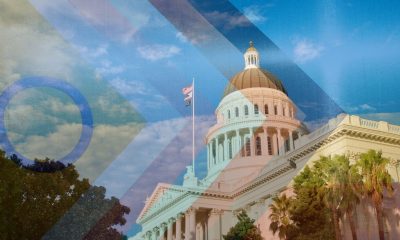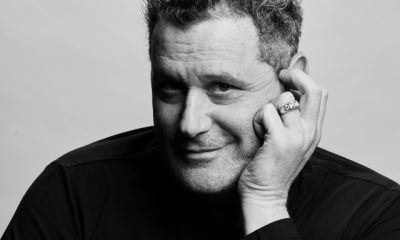opinions
Cory Booker’s missed moral moment
Imagine if trans stories had been part of historic speech

New Jersey Sen. Cory Booker sounded joyous, energetic, and heartfelt during his historic 25-hour, five-minute Senate floor speech.
Like millions of others watching the April 1 conclusion of his marathon homily for everyday people, I spontaneously burst into applause when he crossed the threshold and broke segregationist Strom Thurmond’s racist filibuster record against the Civil Rights Act of 1957. Booker called Thurmond’s 68-year record a “strange shadow” hanging over the Senate.
Booker’s surprise anti-Trump fest, perhaps a predicate for another presidential bid, was a Democratic demonstration of “doing something” in homage to his late mentor, civil rights hero John Lewis’s call to create “good trouble.”
“I rise tonight with the intention of disrupting the normal business of the United States Senate for as long as I am physically able,” Booker said in his opening remarks. “These are not normal times in our nation. And they should not be treated as such in the United States Senate. The threats to the American people and American democracy are grave and urgent and we all must do more to stand against them.”
Unlike others who offer up the usual stale talking points, Booker said, “I rise tonight because to be silent at this moment of national crisis would be a betrayal, and because at stake in this moment is nothing less than everything that makes us who we are,” including “that everyone’s rights will be equally protected and everyone will be held equally accountable under the law.”
Booker’s message was clear: “This is a moral moment in America. What are we going to do?”
It’s a question poking at the conscience of people who believe in fairness. For instance, podcaster Joe Rogan questioned the deportation of a gay hairdresser to a prison camp in El Salvador.
“The thing is, like, you got to get scared that people who are not criminals are getting, like, lassoed up and deported and sent to, like, El Salvador prisons,” Rogan said on Saturday. “This is kind of crazy that that could be possible. That’s horrific. And that’s, again, that’s bad for the cause. The cause is: Let’s get the gang members out. Everybody agrees. But let’s not, innocent gay hairdressers, get lumped up with the gangs.”
In Wisconsin, voters were so angry at unelected DOGE head billionaire Elon Musk blatantly handing out money to generate interest in a state Supreme Court race, they elected liberal Dane County Judge Susan Crawford over Trump-endorsed Waukesha County Judge Brad Schimel in the $100 million contest, the most expensive court race in U.S. history.
“As a little girl growing up in Chippewa Falls, I never imagined I’d be taking on the richest man in the world for justice in Wisconsin — and we won,” Crawford told supporters after her 55 percent to 45 percent victory early Wednesday.
Crawford won despite a last minute anti-trans attack ad. “Let transitioning male teachers use my girls’ bathrooms at school? Allow boys to compete against them in sports? Giving puberty-blocking drugs to children without parents’ consent?,” a woman says in the ad. “That’s who Susan Crawford sides with, and I’m not OK with any of it.”
Apparently Trump’s endorsement and Musk’s millions were not enough to push Schimel to victory; they needed to play the anti-trans card. Crawford’s campaign responded with her own hard-hitting ad that ends with: “I’m Judge Susan Crawford, and I’ll always follow the law and use common sense to decide what’s right.”
Was the last minute play with identity politics helpful or a moot distraction? Many old Democratic politicos want to get rid of identity politics and focus on the issues – as if the two aren’t intertwined.
Indeed, Cory Booker’s symbolism-caked epic discourse illustrated how identity is the beating heart of politics for anyone who’s not a white straight Christian man.
“We have to redeem the dream,” Booker said. “We have to excite people again. He, in the highest office of our land, wants to divide us against ourselves, wants to make us afraid, wants to make us fear so much that we’re willing to violate people’s fundamental rights.”
And yet, other than a quick reference to Stonewall, Booker forgot us during his 25 hours telling stories of regular people. He forgot Harleigh Walker who testified before the Senate Judiciary Committee about being a trans 16-year-old needing gender-affirming care in Auburn, Ala.
At the June 21, 2023 hearing Protecting Pride: Defending the Civil Rights of LGBTQ+ Americans, Booker talked about being a leader on the Equality Act with John Lewis leading in the House.
Lewis, a “Christian, Southern, Black, elder man,” would say that “these [discrimination] issues are so similar to what he was dealing with…Is there a line that goes through about the basic right to be an American and have equal rights?” Booker asked Human Rights Campaign President Kelley Robinson.
“A lot of Americans don’t understand how widespread the bullying and the threats and the violence are,” Booker said. “Something’s happened in the last decade, of this rise of threats and bullying and violence and murder of LGBTQ Americans at levels that are frightening to me.”
Addressing Harleigh Walker, Booker said: “I don’t think most Americans understand what it’s like to try to just live your truth for the average American that is LGBTQ or trans. Could you just tell…how it feels just to be a teenager, living your life as you do?”
“It definitely is a struggle, day to day,” Walker said. “Growing up in a conservative state where there is a lot of misinformation spread about what trans people are, what we do, and how we’re just like everybody else, it’s definitely been hard for me. Like I said in my testimony, I was severely bullied in middle school to the point where I had to drop out of public school because there was so much hate every day in the hallways, being misgendered, being deadnamed, and it got to physical violence at a certain point. And so I had to drop out of public school for that year, and the school wasn’t doing anything about it.”
Booker closed with: “If this is about protecting our children, the stories of Ms. Walker and other trans children — it just needs to be heard about what you’re enduring.”
Imagine if trans stories had been heard as part of Booker’s incredible “Moral Moment” speech. Maybe millions more would have awakened to the idea of fairness and equality for ALL.
Karen Ocamb is the former news editor for the Los Angeles Blade and Frontiers. She is currently working on a new LGBTQ+ Freedom Fighters project.

Opinions
Why is it important for cities to become LGBTQ sanctuary cities?
This is not just a win, it is a small, but monumental stride toward progress, representation and protection

When a city passes the motion to make their city an LGBTQ sanctuary city, it means that city or state resources cannot be used to prosecute or punish LGBTQ people for seeking gender-affirming care, resources or government assistance.
As many of us know, there are three major levels of government: local, state and federal.
City motions set a precedent for the state, adding local representation on a small scale that hypothetically catches on and makes its way up the ladder to the state, then federal level.
Though the Trump administration holds a lot of power on a federal level, states, cities and municipalities hold power on a level that is easier for local communities to change and control. If cities across the state begin passing motions to become LGBTQ sanctuary cities, the state then has to consider passing the motion to become a sanctuary state. If the majority of states consider themselves sanctuary states, it pushes the change on a national, or federal, level.
At first glance, it seems like the move for a city to consider itself an LGBTQ sanctuary city is not a big deal because there is no financial flow in the motion and there are no special funds to be allocated. The only visible change is the new title the city gets to claim. However, passing motions in favor of LGBTQ rights, is crucial toward the longer and harder journey to attain rights on a national level. It is a far more nuanced issue than what it seems.
If that same logic were to hold up when it comes to statewide decisions, then it could become easy to dismantle progress made on any level.
The Advocate published an article in November when the City of Los Angeles unanimously passed the ordinance to become an LGBTQ sanctuary city. Passing the ordinance means that the city is now responsible for “shielding queer youth who travel to the city to receive gender-affirming care from prosecution, as well as preventing city resources from being used in immigration enforcement or assisting federal immigration officials.”
During the November 2024 election, Proposition 3 made it on the ballot and Californians had the choice of voting in favor or against the proposition that would only change the outdated language of the California state constitution, that until recently did not recognize same-sex or interracial marriages. To some, the change seemed meaningless, but on a statewide level, passing this proposition meant cementing the progress made on the protection of same-sex and interracial marriages. Though the proposition had no money flow in the matter, this important move signaled the support of the state in favor of LGBTQ rights on a state level.
While California is already a sanctuary state, it is also crucial to recognize protections and rights in individual cities. During these unprecedented and uncertain times in LGBTQ history, it is more crucial than ever to push for these changes.
When one city makes the move to become a sanctuary city, others follow and LGBTQ representation becomes more visible on a government level.
In November, shortly after Trump was elected as the 47th president of the United States, Los Angeles declared itself an LGBTQ sanctuary city.
Now, Long Beach has followed suit and has unanimously approved a resolution to make the city a transgender sanctuary city and officially recognize March 31 as Trans Day of Visibility.
There are a growing number of LGBTQ sanctuary cities across the nation. In California, the list of cities includes San Francisco, Sacramento, West Hollywood, Los Angeles and most recently, Long Beach.
Other cities, including Boston, Massachusetts; Olympia, Washington; Cambridge, Massachusetts and others across the nation have also recently declared their status in support of LGBTQ people.
This is not just a win – it is a small, but monumental stride toward progress, representation and protection. We need more cities to push motions to become sanctuaries for queer and transgender people as the current administration continues to use queer and trans people as political pawns in the chess game rigged for the alt-right.
-

 Opinions1 day ago
Opinions1 day agoGay for pay: Andy Lee and the changing face of content creation
-

 Opinions1 day ago
Opinions1 day agoWhy is it important for cities to become LGBTQ sanctuary cities?
-

 a&e features1 day ago
a&e features1 day agoFashion icon Isaac Mizrahi brings performances to the West Coast
-

 Noticias en Español2 days ago
Noticias en Español2 days agoSuspensión de fondos de USAID golpea con fuerza a grupos LGBTQ+ en El Salvador
-

 a&e features7 hours ago
a&e features7 hours agoNo longer just a go-go dancer, Prince Joshua debuts ‘Crowned’ EP



